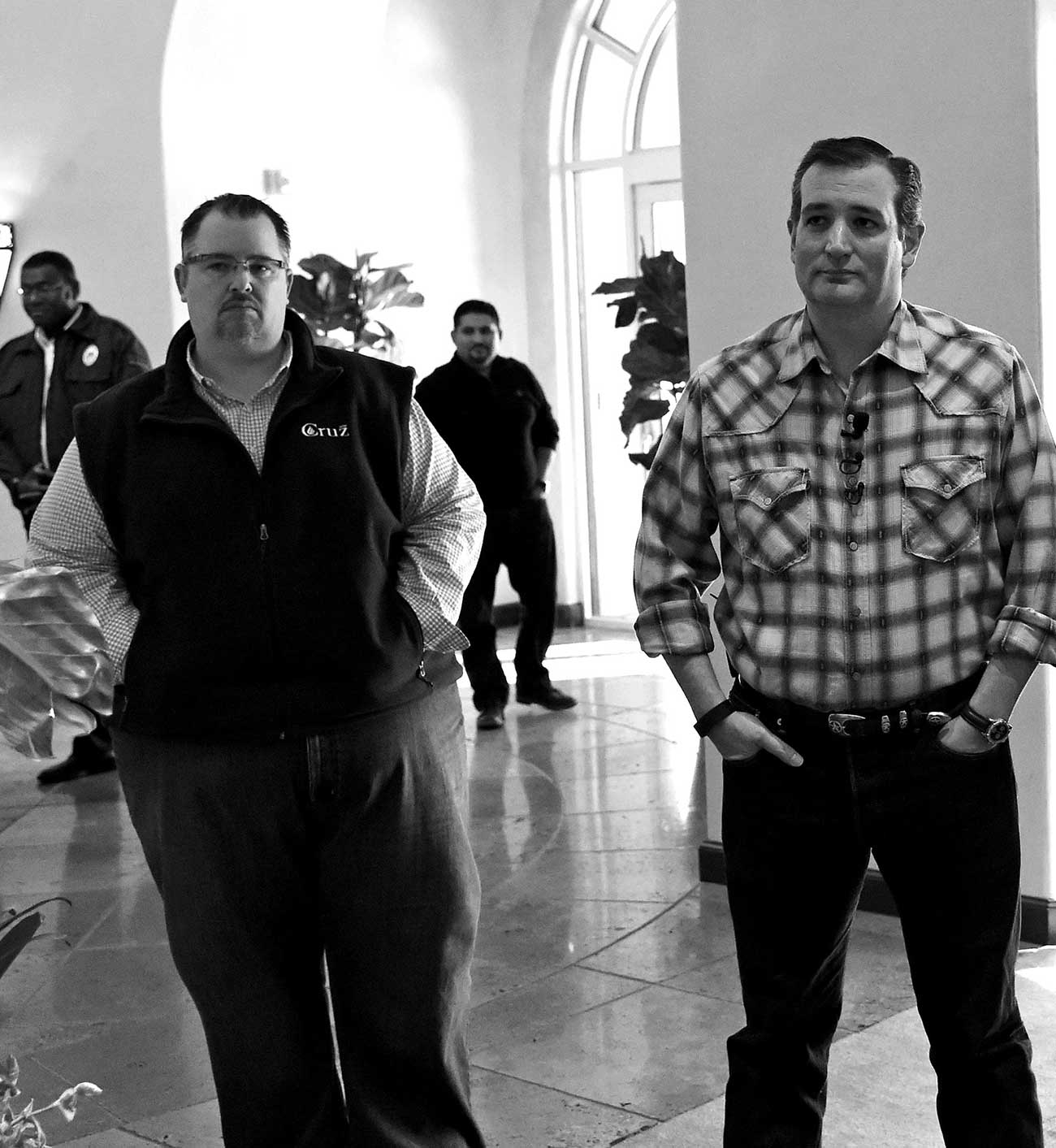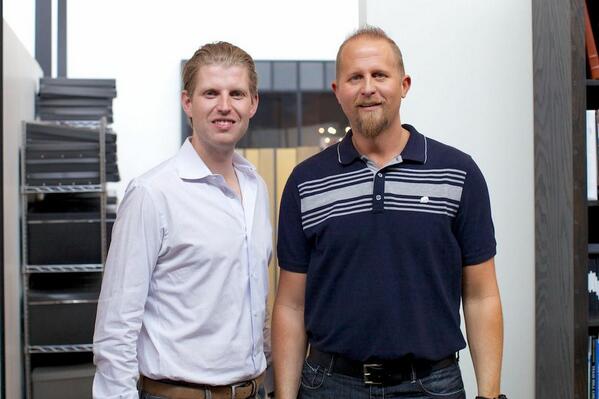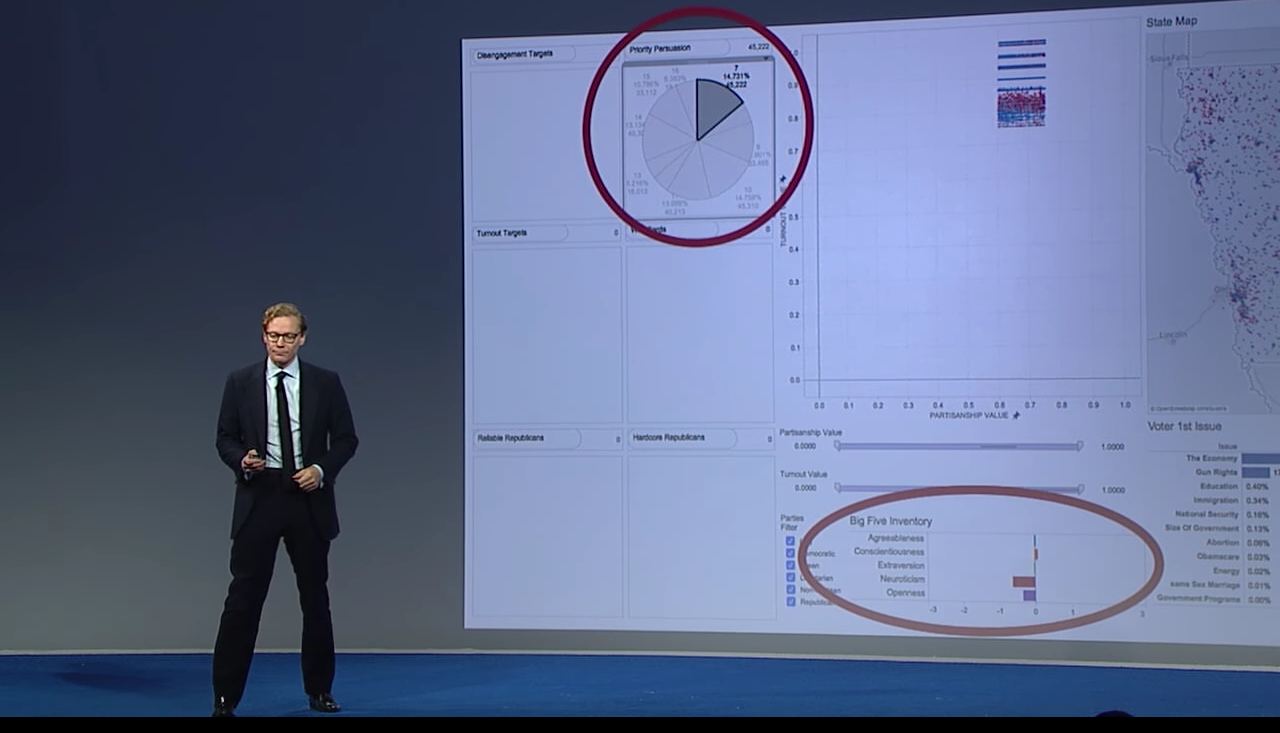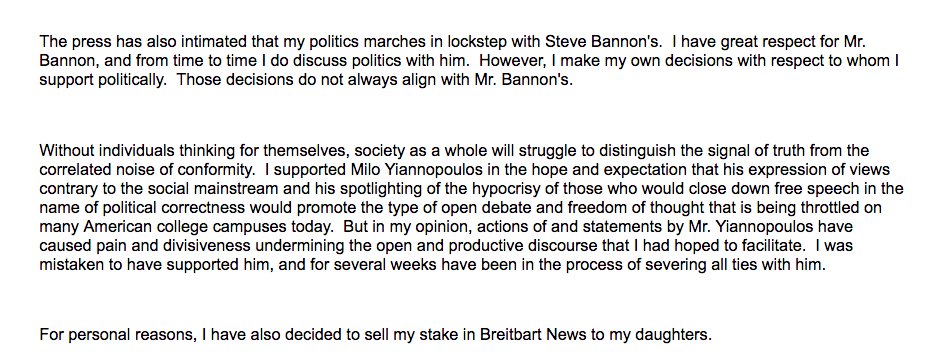MARCH 27, 2017 ISSUE
THE RECLUSIVE HEDGE-FUND TYCOON BEHIND THE TRUMP PRESIDENCYHow Robert Mercer exploited America’s populist insurgency.
By Jane Mayer
Nick Patterson, a former colleague of Mercer’s, said, “In my view, Trump wouldn’t be President if not for Bob.ILLUSTRATION BY OLIVER MUNDAY / ANIMATION BY JAMES IACOBELLI / PHOTOGRAPH BY ANDREW TOTH / GETTY
Last month, when President Donald Trump toured a Boeing aircraft plant in North Charleston, South Carolina, he saw a familiar face in the crowd that greeted him: Patrick Caddell, a former Democratic political operative and pollster who, for forty-five years, has been prodding insurgent Presidential candidates to attack the Washington establishment. Caddell, who lives in Charleston, is perhaps best known for helping Jimmy Carter win the 1976 Presidential race. He is also remembered for having collaborated with his friend Warren Beatty on the 1998 satire “Bulworth.” In that film, a kamikaze candidate abandons the usual talking points and excoriates both the major political parties and the media; voters love his unconventionality, and he becomes improbably popular. If the plot sounds familiar, there’s a reason: in recent years, Caddell has offered political advice to Trump. He has not worked directly for the President, but at least as far back as 2013 he has been a contractor for one of Trump’s biggest financial backers: Robert Mercer, a reclusive Long Island hedge-fund manager, who has become a major force behind the Trump Presidency.
During the past decade, Mercer, who is seventy, has funded an array of political projects that helped pave the way for Trump’s rise. Among these efforts was public-opinion research, conducted by Caddell, showing that political conditions in America were increasingly ripe for an outsider candidate to take the White House. Caddell told me that Mercer “is a libertarian—he despises the Republican establishment,” and added, “He thinks that the leaders are corrupt crooks, and that they’ve ruined the country.”
Trump greeted Caddell warmly in North Charleston, and after giving a speech he conferred privately with him, in an area reserved for V.I.P.s and for White House officials, including Stephen Bannon, the President’s top strategist, and Jared Kushner, Trump’s son-in-law. Caddell is well known to this inner circle. He first met Trump in the eighties. (“People said he was just a clown,” Caddell said. “But I’ve learned that you should always pay attention to successful ‘clowns.’ ”) Caddell shared the research he did for Mercer with Trump and others in the campaign, including Bannon, with whom he has partnered on numerous projects.
The White House declined to divulge what Trump and Caddell discussed in North Charleston, as did Caddell. But that afternoon Trump issued perhaps the most incendiary statement of his Presidency: a tweet calling the news media “the enemy of the American people.” The proclamation alarmed liberals and conservatives alike. William McRaven, the retired Navy admiral who commanded the 2011 raid that killed Osama bin Laden, called Trump’s statement a “threat to democracy.” The President is known for tweeting impulsively, but in this case his words weren’t spontaneous: they clearly echoed the thinking of Caddell, Bannon, and Mercer. In 2012, Caddell gave a speech at a conference sponsored by Accuracy in Media, a conservative watchdog group, in which he called the media “the enemy of the American people.” That declaration was promoted by Breitbart News, a platform for the pro-Trump alt-right, of which Bannon was the executive chairman, before joining the Trump Administration. One of the main stakeholders in Breitbart News is Mercer.
Mercer is the co-C.E.O. of Renaissance Technologies, which is among the most profitable hedge funds in the country. A brilliant computer scientist, he helped transform the financial industry through the innovative use of trading algorithms. But he has never given an interview explaining his political views. Although Mercer has recently become an object of media speculation, Trevor Potter, the president of the Campaign Legal Center, a nonpartisan watchdog group, who formerly served as the chairman of the Federal Election Commission, said, “I have no idea what his political views are—they’re unknown, not just to the public but also to most people who’ve been active in politics for the past thirty years.” Potter, a Republican, sees Mercer as emblematic of a major shift in American politics that has occurred since 2010, when the Supreme Court made a controversial ruling in Citizens United v. Federal Election Commission. That ruling, and several subsequent ones, removed virtually all limits on how much money corporations and nonprofit groups can spend on federal elections, and how much individuals can give to political-action committees. Since then, power has tilted away from the two main political parties and toward a tiny group of rich mega-donors.
Private money has long played a big role in American elections. When there were limits on how much a single donor could give, however, it was much harder for an individual to have a decisive impact. Now, Potter said, “a single billionaire can write an eight-figure check and put not just their thumb but their whole hand on the scale—and we often have no idea who they are.” He continued, “Suddenly, a random billionaire can change politics and public policy—to sweep everything else off the table—even if they don’t speak publicly, and even if there’s almost no public awareness of his or her views.”
Through a spokesman, Mercer declined to discuss his role in launching Trump. People who know him say that he is painfully awkward socially, and rarely speaks. “He can barely look you in the eye when he talks,” an acquaintance said. “It’s probably helpful to be highly introverted when getting lost in code, but in politics you have to talk to people, in order to find out how the real world works.” In 2010, when the Wall Street Journal wrote about Mercer assuming a top role at Renaissance, he issued a terse statement: “I’m happy going through my life without saying anything to anybody.” According to the paper, he once told a colleague that he preferred the company of cats to humans.
Several people who have worked with Mercer believe that, despite his oddities, he has had surprising success in aligning the Republican Party, and consequently America, with his personal beliefs, and is now uniquely positioned to exert influence over the Trump Administration. In February, David Magerman, a senior employee at Renaissance, spoke out about what he regards as Mercer’s worrisome influence. Magerman, a Democrat who is a strong supporter of Jewish causes, took particular issue with Mercer’s empowerment of the alt-right, which has included anti-Semitic and white-supremacist voices. Magerman shared his concerns with Mercer, and the conversation escalated into an argument. Magerman told colleagues about it, and, according to an account in the Wall Street Journal, Mercer called Magerman and said, “I hear you’re going around saying I’m a white supremacist. That’s ridiculous.” Magerman insisted to Mercer that he hadn’t used those words, but added, “If what you’re doing is harming the country, then you have to stop.” After the Journal story appeared, Magerman, who has worked at Renaissance for twenty years, was suspended for thirty days. Undaunted, he published an op-ed in the Philadelphia Inquirer, accusing Mercer of “effectively buying shares in the candidate.” He warned, “Robert Mercer now owns a sizeable share of the United States Presidency.”
Nick Patterson, a former senior Renaissance employee who is now a computational biologist at the Broad Institute, agrees that Mercer’s influence has been huge. “Bob has used his money very effectively,” he said. “He’s not the first person in history to use money in politics, but in my view Trump wouldn’t be President if not for Bob. It doesn’t get much more effective than that.”
Patterson said that his relationship with Mercer has always been collegial. In 1993, Patterson, at that time a Renaissance executive, recruited Mercer from I.B.M., and they worked together for the next eight years. But Patterson doesn’t share Mercer’s libertarian views, or what he regards as his susceptibility to conspiracy theories about Bill and Hillary Clinton. During Bill Clinton’s Presidency, Patterson recalled, Mercer insisted at a staff luncheon that Clinton had participated in a secret drug-running scheme with the C.I.A. The plot supposedly operated out of an airport in Mena, Arkansas. “Bob told me he believed that the Clintons were involved in murders connected to it,” Patterson said. Two other sources told me that, in recent years, they had heard Mercer claim that the Clintons have had opponents murdered.
The Mena story is one of several dark fantasies put forth in the nineties by The American Spectator, an archconservative magazine. According to Patterson, Mercer read the publication at the time. David Brock, a former Spectator writer who is now a liberal activist, told me that the alleged Mena conspiracy was based on a single dubious source, and was easily disproved by flight records. “It’s extremely telling that Mercer would believe that,” Brock said. “It says something about his conspiratorial frame of mind, and the fringe circle he was in. We at the Spectator called them Clinton Crazies.”
Patterson also recalled Mercer arguing that, during the Gulf War, the U.S. should simply have taken Iraq’s oil, “since it was there.” Trump, too, has said that the U.S. should have “kept the oil.” Expropriating another country’s natural resources is a violation of international law. Another onetime senior employee at Renaissance recalls hearing Mercer downplay the dangers posed by nuclear war. Mercer, speaking of the atomic bombs that the U.S. dropped on Hiroshima and Nagasaki, argued that, outside of the immediate blast zones, the radiation actually made Japanese citizens healthier. The National Academy of Sciences has found no evidence to support this notion. Nevertheless, according to the onetime employee, Mercer, who is a proponent of nuclear power, “was very excited about the idea, and felt that it meant nuclear accidents weren’t such a big deal.”
Mercer strongly supported the nomination of Jeff Sessions to be Trump’s Attorney General. Many civil-rights groups opposed the nomination, pointing out that Sessions has in the past expressed racist views. Mercer, for his part, has argued that the Civil Rights Act, in 1964, was a major mistake. According to the onetime Renaissance employee, Mercer has asserted repeatedly that African-Americans were better off economically before the civil-rights movement. (Few scholars agree.) He has also said that the problem of racism in America is exaggerated. The source said that, not long ago, he heard Mercer proclaim that there are no white racists in America today, only black racists. (Mercer, meanwhile, has supported a super pac, Black Americans for a Better Future, whose goal is to “get more Blacks involved in the Republican Party.”)
“Most people at Renaissance didn’t challenge him” about politics, Patterson said. But Patterson clashed with him over climate change; Mercer said that concerns about it were overblown. After Patterson shared with him a scientific paper on the subject, Mercer and his brother, Randall, who also worked at the hedge fund, sent him a paper by a scientist named Arthur Robinson, who is a biochemist, not a climate expert. “It looked like a scientific paper, but it was completely loaded with selective and biased information,” Patterson recalled. The paper argued that, if climate change were real, future generations would “enjoy an Earth with far more plant and animal life.” Robinson owns a sheep ranch in Cave Junction, Oregon, and on the property he runs a laboratory that he calls the Oregon Institute of Science and Medicine. Mercer helps subsidize Robinson’s various projects, which include an effort to forestall aging.
Patterson sent Mercer a note calling Robinson’s arguments “completely false.” He never heard back. “I think if you studied Bob’s views of what the ideal state would look like, you’d find that, basically, he wants a system where the state just gets out of the way,” Patterson said. “Climate change poses a problem for that world view, because markets can’t solve it on their own.”
Magerman told the Wall Street Journal that Mercer’s political opinions “show contempt for the social safety net that he doesn’t need, but many Americans do.” He also said that Mercer wants the U.S. government to be “shrunk down to the size of a pinhead.” Several former colleagues of Mercer’s said that his views are akin to Objectivism, the philosophy of Ayn Rand. Magerman told me, “Bob believes that human beings have no inherent value other than how much money they make. A cat has value, he’s said, because it provides pleasure to humans. But if someone is on welfare they have negative value. If he earns a thousand times more than a schoolteacher, then he’s a thousand times more valuable.” Magerman added, “He thinks society is upside down—that government helps the weak people get strong, and makes the strong people weak by taking their money away, through taxes.” He said that this mind-set was typical of “instant billionaires” in finance, who “have no stake in society,” unlike the industrialists of the past, who “built real things.”
Another former high-level Renaissance employee said, “Bob thinks the less government the better. He’s happy if people don’t trust the government. And if the President’s a bozo? He’s fine with that. He wants it to all fall down.”
The 2016 Presidential election posed a challenge for someone with Mercer’s ideology. Multiple sources described him as animated mainly by hatred of Hillary Clinton. But Mercer also distrusted the Republican leadership. After the candidate he initially supported, Senator Ted Cruz, of Texas, dropped out of the race, Mercer sought a disruptive figure who could upend both the Democratic Party and the Republican Party. Patterson told me that Mercer seems to have applied “a very Renaissance Technologies way of thinking” to politics: “He probably estimated the probability of Trump winning, and when it wasn’t very high he said to himself, ‘O.K., what has to happen in order for this twenty-per-cent thing to occur?’ It’s like playing a card game when you haven’t got a very good hand.”
Mercer, as it happens, is a superb poker player, and his political gamble appears to have paid off. Institutional Investor has called it “Robert Mercer’s Trade of the Century.”
In the 2016 campaign, Mercer gave $22.5 million in disclosed donations to Republican candidates and to political-action committees. Tony Fabrizio, a Republican pollster who worked for the Trump campaign, said that Mercer had “catapulted to the top of the heap of right-of-center power brokers.” It’s worth noting that several other wealthy financiers, including Democrats such as Thomas Steyer and Donald Sussman, gave even more money to campaigns. (One of the top Democratic donors was James Simons, the retired founder of Renaissance Technologies.) Nevertheless, Mercer’s political efforts stand apart. Adopting the strategy of Charles and David Koch, the billionaire libertarians, Mercer enlarged his impact exponentially by combining short-term campaign spending with long-term ideological investments. He poured millions of dollars into Breitbart News, and—in what David Magerman has called “an extreme example of modern entrepreneurial philanthropy”—made donations to dozens of politically tinged organizations.
Like many wealthy families, the Mercers have a private foundation. At first, the Mercer Family Foundation, which was established in 2004, had an endowment of only half a million dollars, and most of its grants went to medical research and conventional charities. But by 2008, under the supervision of Mercer’s ardently conservative daughter, Rebekah, the foundation began giving millions of dollars to interconnected nonprofit groups, several of which played crucial roles in propagating attacks on Hillary Clinton. By 2015, the most recent year for which federal tax records are available, the foundation had grown into a $24.5-million operation that gave large sums to ultraconservative organizations.
On top of this nonprofit spending, Mercer invested in private businesses. He put ten million dollars into Breitbart News, which was conceived as a conservative counterweight to the Huffington Post. The Web site freely mixes right-wing political commentary with juvenile rants and racist innuendo; under Bannon’s direction, the editors introduced a rubric called Black Crime. The site played a key role in undermining Hillary Clinton; by tracking which negative stories about her got the most clicks and “likes,” the editors helped identify which story lines and phrases were the most potent weapons against her. Breitbart News has been a remarkable success: according to ComScore, a company that measures online traffic, the site attracted 19.2 million unique visitors in October.
Mercer also invested some five million dollars in Cambridge Analytica, a firm that mines online data to reach and influence potential voters. The company has said that it uses secret psychological methods to pinpoint which messages are the most persuasive to individual online viewers. The firm, which is the American affiliate of Strategic Communication Laboratories, in London, has worked for candidates whom Mercer has backed, including Trump. It also reportedly worked on the Brexit campaign, in the United Kingdom.
Alexander Nix, the C.E.O. of the firm, says that it has created “profiles”—consisting of several thousand data points—for two hundred and twenty million Americans. In promotional materials, S.C.L. has claimed to know how to use such data to wage both psychological and political warfare. “Persuading somebody to vote a certain way,” Nix has said publicly, “is really very similar to persuading 14- to 25-year-old boys in Indonesia to not join Al Qaeda.” Some critics suggest that, at this point, Cambridge Analytica’s self-promotion exceeds its effectiveness. But Jonathan Albright, an assistant professor of communications at Elon University, in North Carolina, recently published a paper, on Medium, calling Cambridge Analytica a “propaganda machine.”
As important as Mercer’s business investments is his hiring of advisers. Years before he started supporting Trump, he began funding several conservative activists, including Steve Bannon; as far back as 2012, Bannon was the Mercers’ de-facto political adviser. Some people who have observed the Mercers’ political evolution worry that Bannon has become a Svengali to the whole family, exploiting its political inexperience and tapping its fortune to further his own ambitions. It was Bannon who urged the Mercers to invest in a data-analytics firm. He also encouraged the investment in Breitbart News, which was made through Gravitas Maximus, L.L.C., a front group that once had the same Long Island address as Renaissance Technologies. In an interview, Bannon praised the Mercers’ strategic approach: “The Mercers laid the groundwork for the Trump revolution. Irrefutably, when you look at donors during the past four years, they have had the single biggest impact of anybody, including the Kochs.”
Last summer, Bannon and some other activists whom the Mercers have supported—including David Bossie, who initiated the Citizens United lawsuit—came together to rescue Trump’s wobbly campaign. Sam Nunberg, an early Trump adviser who watched Mercer’s group take over, said, “Mercer was smart. He invested in the right people.”
Bannon and Rebekah Mercer have become particularly close political partners. Last month, when Bannon denounced “the corporatist, globalist media” at the Conservative Political Action Conference, in his first public appearance since entering the White House, Rebekah Mercer was part of his entourage. Bannon supports some initiatives, such as a major infrastructure program, that are anathema to libertarians such as Robert Mercer. But the Wall Street Journal has described Bannon joking and swearing on the deck of the Mercers’ yacht, the Sea Owl, as if he were a member of the family. Bannon assured me that the Mercers, despite all their luxuries, are “the most middle-class people you will ever meet.”
Robert and Diana Mercer brought up their three daughters in a modest home near I.B.M.’s Thomas J. Watson Research Center, in Westchester County. The girls attended public schools, and Robert and Diana worried about paying three college tuitions. According to Donna D’Andraia, a family friend, Diana was a PTA member and a “tiger mom” who “made sure that the girls did all the right things—they were in the honor society, and stayed out of trouble.” D’Andraia recalled Diana saying that Robert was brilliant, but D’Andraia found it hard to tell, because “he was very quiet—he didn’t talk to anybody.”
The eldest Mercer daughter, Jennifer, or Jenji, attended Stanford. Rebekah, the middle daughter, enrolled at Cornell and then transferred to Stanford. Majoring in biology and math, she graduated in 1996; a few years later, she got an M.A., in operations research. The youngest daughter, Heather Sue, “was the spitfire,” D’Andraia recalled. When Heather Sue was a junior in high school, she tried out to be a place kicker on the football team. She made it, and, after enrolling at Duke University, she joined its varsity squad. When the Duke coach refused to treat her as the equal of her male teammates, she sued the school for gender discrimination, and won two million dollars in damages. Ron Santavicca, Heather Sue’s high-school coach, described the Mercers, who still invite him to their Christmas parties, as “the salt of the earth.” He added, “The whole family is very determined. When they have a mission, they go after it.”
In 1993, when Nick Patterson mailed Robert Mercer a job offer from Renaissance, Mercer threw it in the trash: he’d never heard of the hedge fund. At the time, Mercer was part of a team pioneering the use of computers to translate languages. I.B.M. considered the project a bit of a luxury, and didn’t see its potential, though the work laid the foundation for Google Translate and Apple’s Siri. But Mercer and his main partner, Peter Brown, found the project exciting, and had the satisfaction of showing up experts in the field, who had dismissed their statistical approach to translating languages as impractical. Instead of trying to teach a computer linguistic rules, Mercer and Brown downloaded enormous quantities of dual-language documents—including Canadian parliamentary records—and created code that analyzed the data and detected patterns, enabling predictions of probable translations. According to a former I.B.M. colleague, Mercer was obsessive, and at one point took six months off to type into a computer every entry in a Spanish-English dictionary. Sebastian Mallaby, in his 2010 book on the hedge-fund industry, “More Money Than God,” reports that Mercer’s boss at I.B.M. once jokingly called him an “automaton.”
In 2014, Mercer accepted a lifetime-achievement award from the Association for Computational Linguistics. In a speech at the ceremony, Mercer, who grew up in New Mexico, said that he had a “jaundiced view” of government. While in college, he had worked on a military base in Albuquerque, and he had showed his superiors how to run certain computer programs a hundred times faster; instead of saving time and money, the bureaucrats ran a hundred times more equations. He concluded that the goal of government officials was “not so much to get answers as to consume the computer budget.” Mercer’s colleagues say that he views the government as arrogant and inefficient, and believes that individuals need to be self-sufficient, and should not receive aid from the state. Yet, when I.B.M. failed to offer adequate support for Mercer and Brown’s translation project, they secured additional funding from darpa, the secretive Pentagon program. Despite Mercer’s disdain for “big government,” this funding was essential to his early success.
Meanwhile, Patterson kept asking Mercer and Brown to join Renaissance. He thought that their technique of extracting patterns from huge amounts of data could be applied to the pile of numbers generated daily by the global trade in stocks, bonds, commodities, and currencies. The patterns could generate predictive financial models that would give traders a decisive edge.
In the spring of 1993, Mercer experienced two devastating losses: his mother was killed, in a car crash, and his father, a biologist, died six weeks later. With life’s precariousness made painfully clear, and with tuition bills mounting, he decided to leave I.B.M. for a higher-paying job at Renaissance. Brown made the leap, too.
Renaissance was founded by James Simons, a legendary mathematician, in 1982. Simons had run the math department at Stony Brook University, on Long Island, and the hedge fund took a uniquely academic approach to high finance. Andrew Lo, a finance professor at M.I.T.’s Sloan School of Management, has described it as “the commercial version of the Manhattan Project.” Intensely secretive and filled with people with Ph.D.s, it has been sensationally profitable. Its Medallion Fund, which is open only to the firm’s three hundred or so employees, has averaged returns of almost eighty per cent a year, before fees. Bloomberg News has called the Medallion Fund “perhaps the world’s greatest moneymaking machine.”
In “More Money Than God,” Mallaby, who interviewed Mercer, describes his temperament as that of an “icy cold poker player”; Mercer told him that he could not recall ever having had a nightmare. But Mercer warms up when talking about computers. In the 2014 speech, he recalled the first time he used one, at a science camp, and likened the experience to falling in love. He also spoke of the government lab in New Mexico. “I loved the solitude of the computer lab late at night,” he said. “I loved the air-conditioned smell of the place. I loved the sound of the disks whirring and the printers clacking.” The speech lasted forty minutes—“more than I typically talk in a month,” he noted.
Patterson told me that when Mercer arrived at Renaissance the firm’s equities division was lagging behind other areas, such as futures trading. Mercer and Brown applied their algorithms to equities trading. “It took several years,” Patterson recalled, but the equities group eventually accounted for the largest share of the Medallion Fund’s profits. Mercer and Brown’s code took into account nearly every conceivable predictor of market swings; their secret formula became so valuable that, when a pair of Russian mathematicians at the firm tried to take the recipe elsewhere, the company initiated legal action against them.
Renaissance’s profits were further enhanced by a controversial tax maneuver, which became the subject of a 2014 Senate inquiry. According to Senate investigators, Renaissance had presented countless short-term trades as long-term ones, improperly avoiding some $6.8 billion in taxes. The Senate didn’t allege criminality, but it concluded that Renaissance had committed “abuses.” The I.R.S. demanded payment. (Renaissance defended its practices, and the matter remains contested, leaving a very sensitive material issue pending before the Trump Administration.)
The Medallion Fund made Renaissance employees among the wealthiest people in the country. Forbes estimates that Simons, who has the biggest share, is worth eighteen billion dollars. In 2009, Simons stepped aside, to focus on philanthropy, and named Mercer and Brown co-C.E.O.s. Institutional Investor’s Alpha estimates that, in 2015, Mercer earned a hundred and thirty-five million dollars at Renaissance.
Mercer’s fortune has allowed him and his family to indulge their wildest material fantasies. He and Diana moved into a waterfront estate in Head of the Harbor, a seaside community on Long Island, and called the property Owl’s Nest. Mercer, a gun enthusiast, built a private pistol range there. (He is also a part owner of Centre Firearms, a company that claims to have the country’s largest private cache of machine guns, as well as a weapon that Arnold Schwarzenegger wielded in “The Terminator.”) At Owl’s Nest, Mercer has installed a $2.7-million model-train set in his basement; trains chug through a miniature landscape half the size of a basketball court. The toy train attracted unwanted tabloid headlines, such as “boo-hoo over 2m choo-choo,” after Mercer sued the manufacturer for overcharging him. (The case was settled.)
Mercer retains a domestic staff that includes a butler and a physician; both accompany him whenever he travels. But this, too, has sparked bad publicity. In 2013, three members of the household staff sued to recover back wages, claiming that Mercer had failed to pay overtime, as promised, and that he had deducted pay as punishment for poor work. One infraction that Mercer cited as a “demerit” was a failure to replace shampoo bottles that were two-thirds empty. This suit, too, was settled.
Mercer has bought several spectacular yachts, including the Sea Owl, which is two hundred and three feet long. A 2013 photo shows the gates of the Tower Bridge, in London, raised high to allow it to proceed up the Thames. The Sea Owl has a crew of eighteen, and features a hand-carved “tree” that twists through four levels of decks. Designed, in part, as a place where the extended Mercer family can gather, the yacht has many fanciful and didactic touches for the Mercer grandchildren, such as frescoes that allude to the discoveries of Darwin and Newton. There’s a self-playing Steinway, a spa pool, and an elevator.
Mercer has given major credit to his family for the yacht’s special details, telling Boat International that they are “endowed with both exceptionally good taste and exceptionally strong opinions.” The Mercer daughters are indeed forceful. When a Manhattan bakery that the sisters loved, Ruby et Violette, threatened to close, depriving the Mercers of their favorite cookies, they bought it. In a Fox News interview, Heather Sue recalled telling the others, “We are going to buy a bakery!” The Mercers still own the business, although it is now online-only.
After graduating from Duke, Heather Sue began competing in high-stakes poker tournaments; she is admired on the circuit for her cool manner. When Mercer insisted that Heather Sue take a security guard with her, Santavicca said, “they became friends, then they became whatever, and now they’re married, with two beautiful daughters.”
Jenji has a law degree from Georgetown, but she has pursued an interest in horses instead. In 2008, the Mercers bought a horse farm in Wellington, Florida, for $5.9 million. Jenji and Diana regularly attend the Winter Equestrian Festival, in Palm Beach. They are investors in an equestrian center in North Carolina, and have announced plans to open one in Colorado. Diana is also listed as the owner of Equinimity, a horse stable in Florida. According to the stable’s Web site, it specializes in Equine Facilitated Learning, a system that teaches “non-verbal leadership and interpersonal communication skills through non-predatory horse-inspired wisdom.”
Rebekah worked for a few years at Renaissance after graduating from Stanford. A former colleague recalls her as smart but haughty. In 2003, she married a Frenchman, Sylvain Mirochnikoff, who is a managing director of Morgan Stanley. They had four children and bought a twenty-eight-million-dollar property—six apartments joined together—at Trump Place, on the Upper West Side. Now forty-three, she is divorcing Mirochnikoff. She homeschools the children, but in recent years she has become consumed by politics. “She is the First Lady of the alt-right,” Christopher Ruddy, the owner of the conservative outlet Newsmax Media, said. “She’s respected in conservative circles, and clearly Trump has embraced her in a big way.”
Amity Shlaes, the conservative writer and the chair of the Calvin Coolidge Presidential Foundation, where Rebekah Mercer is a trustee, told me, “In the dull crowds of policy, the Mercers are enchanting firecrackers.” She likened the Mercer sisters to the Schuylers—the high-spirited, witty sisters made famous by the musical “Hamilton.” Shlaes went on, “The Mercers have strong values, they’re kind of funny, and they’re really bright. Their brains are almost too strong.” Rebekah, she noted, supports several think tanks, but grows tired of talk; she “is into action.”
After the Citizens United decision, in 2010, the Mercers were among the first people to take advantage of the opportunity to spend more money on politics. In Oregon, they quietly gave money to a super pac—an independent campaign-related group that could now take unlimited donations. In New York, reporters discovered that Robert Mercer was the sole donor behind a million-dollar advertising campaign attacking what it described as a plan to build a “Ground Zero Mosque” in Manhattan. The proposed building was neither a mosque nor at Ground Zero. The ads, which were meant to boost a Conservative Party candidate for governor, were condemned as Islamophobic.
In Oregon, the Mercers gave six hundred and forty thousand dollars to a group that attacked Representative Peter DeFazio, a Democrat, with a barrage of negative ads during the final weeks of his 2010 reëlection campaign. This effort also failed—it didn’t help when DeFazio announced that a New York hedge-fund manager and his daughter were meddling in Oregon politics.
Press accounts speculated that Robert Mercer may have targeted DeFazio because DeFazio had proposed a tax on a type of high-volume stock trade that Renaissance frequently made. But several associates of Mercer’s say that the truth is stranger. DeFazio’s Republican opponent was Arthur Robinson—the biochemist, sheep rancher, and climate-change denialist. The Mercers became his devoted supporters after reading Access to Energy, an offbeat scientific newsletter that he writes. The family has given at least $1.6 million in donations to Robinson’s Oregon Institute of Science and Medicine. Some of the money was used to buy freezers in which Robinson is storing some fourteen thousand samples of human urine. Robinson has said that, by studying the urine, he will find new ways of extending the human life span.
Robinson holds a degree in chemistry from Caltech, but his work is not respected in most scientific circles. (The Oregon senator Jeff Merkley, a Democrat, has called Robinson an “extremist kook.”) Robinson appears to be the source of Robert Mercer’s sanguine view of nuclear radiation: in 1986, Robinson co-authored a book suggesting that the vast majority of Americans would survive “an all-out atomic attack on the United States.” Robinson’s institute dismisses climate change as a “false religion.” A petition that he organized in 1998 to oppose the Kyoto Protocol, claiming to represent thirty thousand scientists skeptical of global warming, has been criticized as deceptive. The National Academy of Sciences has warned that the petition never appeared in a peer-reviewed journal, though it is printed in “a format that is nearly identical to that of scientific articles.” The petition, however, still circulates online: in the past year, it was the most shared item about climate change on Facebook.
Robinson, who calls himself a “Jesus-plus-nothing-else” Christian, has become a hero to the religious right for homeschooling his six children. Robert and Rebekah Mercer have praised a curriculum that Robinson sells. (An advertisement for it casts doubt on evolution: “No demonstration has ever been made of the process of ‘spontaneous origin of life.’ ”) Robinson has said that the “socialist” agenda of public schools is “evil” and represents “a form of child abuse.”
Even though 2010 was a successful election year for Republicans, the candidates that the Mercers had supported in Oregon and New York both lost decisively. Their investments had achieved nothing. Wealthy political donors sometimes make easy marks for campaign operatives. Patrick Caddell, the former pollster, told me, “These people who get so rich by running businesses get so taken in when it comes to politics. They’re just sheep. The consultants suck it out of them. A lot of them are surrounded by palace guards, but that’s not true of the Mercers.”
By 2011, the Mercers had joined forces with Charles and David Koch, who own Koch Industries, and who have run a powerful political machine for decades. The Mercers attended the Kochs’ semiannual seminars, which provide a structure for right-wing millionaires looking for effective ways to channel their cash. The Mercers admired the savviness of the Kochs’ plan, which called for attendees to pool their contributions in a fund run by Koch operatives. The fund would strategically deploy the money in races across the country, although, at the time, the Kochs’ chief aim was to defeat Barack Obama in 2012. The Kochs will not reveal the identities of their donors, or the size of contributions, but the Mercers reportedly began giving at least a million dollars a year to the Kochs’ fund. Eventually, they contributed more than twenty-five million.
The Mercers also joined the Council for National Policy, which the Times has described as a “little-known club of a few hundred of the most powerful conservatives in the country.” The Mercers have contributed hundreds of thousands of dollars. The group swears participants to secrecy. But a leaked 2014 roster revealed that it included many people who promoted anti-Clinton conspiracy stories, including Joseph Farah, the editor of WorldNetDaily. The group also brought the Mercers into the orbit of two people who have become key figures in the Trump White House: Kellyanne Conway, who was on the group’s executive committee, and Steve Bannon.
In 2011, the Mercers met Andrew Breitbart, the founder of the fiery news outlet that bears his name, at a conference organized by the Club for Growth, a conservative group. They were so impressed by him that they became interested in investing in his operation. Breitbart, a gleefully offensive provocateur, was the temperamental opposite of Robert Mercer. (In 2010, Breitbart told this magazine, “I like to call someone a raving cunt every now and then, when it’s appropriate, for effect.”) Nevertheless, the Mercers were attracted to Breitbart’s vision of “taking back the culture” by building a media enterprise that could wage information warfare against the mainstream press, empowering what Breitbart called “the silenced majority.”
Breitbart soon introduced the Mercers to Steve Bannon. For a while, Breitbart News operated out of office space that Bannon owned in Santa Monica. A Harvard Business School graduate, Bannon had worked at Goldman Sachs, but he eventually left the world of finance and began making political films. His ambition, apparently, was to become the Michael Moore of the right. In the aughts, he directed polemical documentaries, among them “Fire from the Heartland” and “District of Corruption.” A former associate of Bannon’s in California recalls him as a strategic thinker who was adept at manipulating the media. A voracious reader, he was quick and charming, but, according to the former associate, he had a chip on his shoulder about class. He often spoke of having grown up in a blue-collar Irish Catholic family in Richmond, Virginia, and of having served as a naval officer when he was young. Bannon seemed to feel excluded from the social world of Wall Street peers who had attended prep schools. He had left Goldman Sachs, in 1990, without making partner, and, though he was well off, he had missed out on the gigantic profits that partners had made when the company went public, in 1999.
In 2011, Bannon drafted a business plan for the Mercers that called for them to invest ten million dollars in Breitbart News, in exchange for a large stake. At the time, the Breitbart site was little more than a collection of blogs. The Mercers signed the deal that June, and one of its provisions placed Bannon on the company’s board.
Nine months later, Andrew Breitbart died, at forty-three, of a heart attack, and Bannon became the site’s executive chairman, overseeing its content. The Mercers, meanwhile, became Bannon’s principal patrons. The Washington Post recently published a house-rental lease that Bannon signed in 2013, on which he said that his salary at Breitbart News was seven hundred and fifty thousand dollars.
Under Bannon’s leadership, the Web site expanded dramatically, adding a fleet of full-time writers. It became a new force on the right, boosting extreme insurgents against the G.O.P. establishment, such as David Brat, who, in 2014, took the seat of Eric Cantor, the Virginia congressman. But it also provided a public forum for previously shunned white-nationalist, sexist, and racist voices. One pundit hired by Bannon was Milo Yiannopoulos, who specialized in puerile insults. (He recently resigned from the site, after a video of him lewdly defending pederasty went viral.)
In 2014, Bannon began hosting a radio show that often featured Patrick Caddell, who effectively had been banished by Democratic Party leaders after years of tempestuous campaigns and fallings-out. On the air, Caddell floated dark theories about Hillary Clinton, and often sounded a lot like Bannon, describing “economic nationalism” as the driving force in American politics. Under Barack Obama, he said, America had turned into a “banana republic.”
By 2016, Breitbart News claims, it had the most shared political content on Facebook, giving the Mercers a platform that no other conservative donors could match. Rebekah Mercer is highly engaged with Breitbart’s content. An insider there said, “She reads every story, and calls when there are grammatical errors or typos.” Though she doesn’t dictate a political line to the editors, she often points out areas of coverage that she thinks require more attention. Her views about the Washington establishment, including the Republican leadership, are scathing. “She was at the avant-garde of shuttering both political parties,” the insider at Breitbart said. “She went a long way toward the redefinition of American politics.”
The Mercers’ investment in Breitbart enabled Bannon to promote anti-establishment politicians whom the mainstream media dismissed, including Trump. In 2011, David Bossie, the head of the conservative group Citizens United, introduced Trump to Bannon; at the time, Trump was thinking about running against Obama. Bannon and Trump met at Trump Tower and discussed a possible campaign. Trump decided against the idea, but the two kept in touch, and Bannon gave Trump admiring coverage. Bannon noticed that, when Trump spoke to crowds, people were electrified. Bannon began to think that Trump might be “the one” who could shake up American politics.
“Breitbart gave Trump a big role,” Sam Nunberg, the aide who worked on the early stages of Trump’s campaign, has said. “They gave us an outlet. No one else would. It allowed us to define our narrative and communicate our message. It really started with the birther thing”—Trump’s false claim that Obama was not born an American citizen—“and then immigration, and Iran. Trump was developing his message.” By 2013, Nunberg said, Trump, like others on Breitbart, was “hitting the establishment” by slamming the Republican leadership in Congress, including Paul Ryan. Nunberg added, “It wasn’t like Charlie Rose was asking us on.”
The Mercer Family Foundation kept expanding its political investments. Between 2011 and 2014, it gave nearly eleven million dollars to the Media Research Center, an advocacy group whose “sole mission,” according to its Web site, “is to expose and neutralize the propaganda arm of the Left: the national news media.” The group’s founder, L. Brent Bozell III, is best known for his successful campaign to get CBS sanctioned for showing Janet Jackson’s bared breast during the 2004 Super Bowl broadcast. The Mercers have been among the M.R.C.’s biggest donors, and their money has allowed the group to revamp its news site, and it now claims to reach more than two hundred million Americans a week.
In 2012, the Mercer Family Foundation donated two million dollars to Citizens United, which had trafficked in Clinton hatred for years. During the Clinton Administration, David Bossie, the group’s leader, was a Republican congressional aide, and he was forced to resign after releasing misleading material about a Clinton associate. In 2008, Citizens United released a vitriolic film, “Hillary: The Movie.” Two years ago, after the group received an additional five hundred and fifty thousand dollars from the Mercers’ foundation, it filed a Freedom of Information Act request demanding access to Hillary Clinton’s State Department e-mails. When the e-mails were released, her Presidential campaign became mired in negative news stories.
Bannon has often collaborated with Bossie, producing half a dozen films with him. In 2012, Bossie suggested a new joint project: a movie that urged Democrats and independents to abandon Obama in the Presidential election. The film’s approach was influenced by polling work that Patrick Caddell had shared with Bannon. The data suggested that attacking Obama was counterproductive; it was more effective to express “disappointment” in him, by contrasting him with earlier Presidents.
Caddell and Bannon made an unholy alliance, but they had things in common: both men were Irish Catholic sons of the South, scourges to their respective parties, and prone to apocalyptic pronouncements. “We hit it off right away,” Caddell told me. “We’re both revolutionaries.” Bannon was excited by Caddell’s polling research, and he persuaded Citizens United to hire Caddell to convene focus groups of disillusioned Obama supporters. Many of these voters became the central figures of “The Hope & the Change,” an anti-Obama film that Bannon and Citizens United released during the 2012 Democratic National Convention. After Caddell saw the film, he pointed out to Bannon that its opening imitated that of “Triumph of the Will,” the 1935 ode to Hitler, made by the Nazi filmmaker Leni Riefenstahl. Bannon laughed and said, “You’re the only one that caught it!” In both films, a plane flies over a blighted land, as ominous music swells; then clouds in the sky part, auguring a new era. The disappointed voters in the film “seared into me,” Bannon said, the fact that middle-class Americans badly wanted change, and could be lured away from the Democratic Party if they felt that they had been conned.
In 2012, Citizens United’s foundation paid Bannon Strategic Advisors, a consultancy group founded by Bannon, three hundred thousand dollars for what it described to the I.R.S. as “fund-raising” services. Bossie told me that the tax filing must have been made in error: the payment was actually for Bannon’s “film development” work. Charitable groups are barred from spending tax-deductible contributions on partisan politics, yet, as Breitbart News noted at the time, “The Hope & the Change” was a “partisan” film “targeting Democrats” during an election year. Even so, the Mercers took a hefty tax deduction for their two-million-dollar donation to Citizens United.
Bossie told me that “the Mercers are very interested in films.” Indeed, Rebekah Mercer is on the board of the Moving Picture Institute, a conservative group devoted to countering Hollywood liberalism with original online entertainment. Among its recent projects was a cartoon, “Everyone Coughs,” which spread the rumor that Hillary Clinton was mortally ill. The film ended by depicting an animated Clinton literally coughing herself to death.
On Election Night in 2012, the Mercers and other top conservative donors settled into the V.I.P. section of a Republican Party victory celebration, having been assured that their investments would pay off. Obama’s defeat of Mitt Romney particularly infuriated Rebekah Mercer, who concluded that the pollsters, the data crunchers, and the spin doctors were all frauds. Soon afterward, Republican Party officials invited big donors to the University Club, in New York, for a postmortem on the election. Attendees were stunned when Rebekah Mercer “ripped the shit out of them,” a friend of hers told me, adding, “It was really her coming out.” As the Financial Times has reported, from that point on Mercer wanted to know exactly how her donations were being spent, and wanted to invest only in what another friend described as “things that she thinks put lead on the target.”
That year, Rebekah Mercer joined the board of the Government Accountability Institute, a nonprofit group, based in Tallahassee, which Bannon had recently founded. In 2013, the Mercer Family Foundation contributed a million dollars to the institute, and in 2014 it contributed another million. In 2015, it donated $1.7 million, which exceeded the group’s entire budget the previous year. The G.A.I., meanwhile, paid Bannon three hundred and seventy-six thousand dollars during its first four years; it told the I.R.S. that Bannon was working for it thirty hours a week, ostensibly on top of his full-time job running Breitbart News.
The G.A.I. billed itself as a nonpartisan research institute, but in 2015 Bannon told Bloomberg Businessweek that its mission was to dig up dirt on politicians and feed it to the mainstream media. (A G.A.I. staffer called this “weaponizing” information.) The group reportedly hired an expert to comb the Deep Web—sites that don’t show up in standard searches—for incriminating information about its targets. The plan was to exploit the mainstream media’s growing inability to finance investigative reporting by doing it for them. The strategy paid off spectacularly in April, 2015, when the Times ran a front-page article based on the book “Clinton Cash,” a compendium of corruption allegations against the Clintons, which was written by the G.A.I.’s president, the conservative writer Peter Schweizer. (The G.A.I. had given the paper an advance copy.) The book triggered one story after another about Hillary Clinton’s supposed criminality, and became a best-seller. In 2016, a film version, co-produced by Bannon and Rebekah Mercer, débuted at the Cannes Film Festival, as the Mercers’ yacht bobbed offshore.
The G.A.I. also undermined Jeb Bush, the candidate favored by the Republican establishment, with another Schweizer book, “Bush Bucks.” As Bannon put it in a 2015 interview, it depicted Bush as a figure of “grimy, low-energy crony capitalism.”
During this period, the Mercers continued giving money to election campaigns. In 2014, Robert Mercer made a two-and-a-half-million-dollar contribution to the Kochs’ Freedom Partners Action Fund. This exceeded the two-million-dollar contributions of David and Charles Koch, prompting a memorable headline about Mercer from Bloomberg News: “the man who out-koched the kochs.”
Rebekah Mercer, meanwhile, was growing impatient with the Kochs. She felt that they needed to investigate why their network had failed to defeat Obama in 2012. Instead, the Kochs gathered donors and presented them with more empty rhetoric. Mercer demanded an accounting of what had gone wrong, and when they ignored her she decided to start her own operation. In a further blow, Mercer soured several other top donors on the Kochs.
In 2012, one area in which the Republicans had lagged badly behind the Democrats was in the use of digital analytics. The Mercers decided to finance their own big-data project. In 2014, Michal Kosinski, a researcher in the psychology department at the University of Cambridge, was working in the emerging field of psychometrics, the quantitative study of human characteristics. He learned from a colleague that a British company, Strategic Communication Laboratories, wanted to hire academics to pursue similar research, for commercial purposes. Kosinski had circulated personality tests on Facebook and, in the process, obtained huge amounts of information about users. From this data, algorithms could be fashioned that would predict people’s behavior and anticipate their reactions to other online prompts. Those who took the Facebook quizzes, however, had been promised that the information would be used strictly for academic purposes. Kosinski felt that repurposing it for commercial use was unethical, and possibly illegal. His concerns deepened when he researched S.C.L. He was disturbed to learn that the company specialized in psychological warfare, and in influencing elections. He spurned the chance to work with S.C.L., although his colleague signed a contract with the company.
Kosinski was further disconcerted when he learned that a new American affiliate of S.C.L., Cambridge Analytica—owned principally by an American hedge-fund tycoon named Robert Mercer—was attempting to influence elections in the U.S. Kosinski, who is now an assistant professor of organizational behavior at Stanford’s business school, supports the idea of using psychometric data to “nudge” people toward socially positive behavior, such as voting. But, he told me, “there’s a thin line between convincing people and manipulating them.”
It is unclear if the Mercers have pushed Cambridge Analytica to cross that line. A company spokesman declined to comment for this story. What is clear is that Mercer, having revolutionized the use of data on Wall Street, was eager to accomplish the same feat in the political realm. He screened many data-mining companies before investing, and he chose Cambridge Analytica, in part, because its high concentration of accomplished scientists reminded him of Renaissance Technologies. Rebekah Mercer, too, has been deeply involved in the venture. Cambridge Analytica shares a corporate address in Manhattan with a group she chairs, Reclaim New York, which opposes government spending. (Bannon has reportedly served as a corporate officer for both Reclaim and Cambridge Analytica.)
Political scientists and consultants continue to debate Cambridge Analytica’s record in the 2016 campaign. David Karpf, an associate professor at George Washington University who studies the political use of data, calls the firm’s claim to have special psychometric powers “a marketing pitch” that’s “untrue.” Karpf worries, though, that the company “could take a very dark turn.” He explained, “What they could do is set up a MoveOn-style operation with a Tea Party-ish list that they could whip up. Typically, lists like that are used to pressure elected officials, but the dangerous thing would be if it was used instead to pressure fellow-citizens. It could encourage vigilantism.” Karpf said of Cambridge Analytica, “There is a maximalist scenario in which we should be terrified to have a tool like this in private hands.”
Cambridge Analytica is not the only data-driven political project that the Mercers have backed. In 2013, at a conservative conference in Palm Beach, an oil tycoon named William Lee Hanley, who had commissioned some polls from Patrick Caddell, asked him to show the data to Mercer and Bannon, who were at the event. The data showed mounting anger toward wealthy élites, who many Americans believed had corrupted the government so that it served only their interests. There was a hunger for a populist Presidential candidate who would run against the major political parties and the ruling class. The data “showed that someone could just walk into this election and sweep it,” Caddell told me. When Mercer saw the numbers, he asked for the polling to be repeated. Caddell got the same results. “It was stunning,” he said. “The country was on the verge of an uprising against its leaders. I just fell over!”
Until Election Day in 2016, Mercer and Hanley—two of the richest men in America—paid Caddell to keep collecting polling data that enabled them to exploit the public’s resentment of élites such as themselves. Caddell’s original goal was to persuade his sponsors to back an independent candidate, but they never did. In 2014, Caddell and two partners went public with what they called the Candidate Smith project, which promoted data suggesting that the public wanted a “Mr. Smith Goes to Washington” figure—an outsider—as President. During the next year or so, Caddell’s poll numbers tilted more and more away from the establishment. Caddell’s partner Bob Perkins, an advertising executive and a former finance director of the Republican Party, told me, “By then, it was clear there wouldn’t be a third-party candidate. But we thought that a Republican who harnessed the angst had a real chance.” At one point, Caddell tested all the declared Presidential candidates, including Trump, as a possible Mr. Smith. “People didn’t think Trump had the temperament to be President,” Caddell said. “He clearly wasn’t the best Smith, but he was the only Smith. He was the only one with the resources and the name recognition.” As Bernie Sanders’s campaign showed, the populist rebellion wasn’t partisan. Caddell worried, though, that there were dark undertones in the numbers: Americans were increasingly yearning for a “strong man” to fix the country.
Caddell circulated his research to anyone who would listen, and that included people inside the Trump campaign. “Pat Caddell is like an Old Testament prophet,” Bannon said. “He’s been talking about alienation of the voters for twenty-five years, and people didn’t pay attention—but he’s a brilliant guy, and he nailed it.” The political consultant and strategist Roger Stone, who is a longtime Trump confidant, was fascinated by the research, and he forwarded a memo about it to Trump. Caddell said that he spoke with Trump about “some of the data,” but noted, “With Trump, it’s all instinct—he is not exactly a deep-dive thinker.”
Robert Mercer, too, was kept informed. Perkins said, “He just loves the numbers. Most people say, ‘Tell me what you think—don’t show me the numbers.’ But he’s, like, ‘Give me the numbers!’ ”
During the 2016 campaign, as the Mercers considered which Presidential candidate to back, they rejected insiders such as Jeb Bush and Marco Rubio, who they believed couldn’t win. They initially gravitated toward Ted Cruz, in part because he was an outsider in the Senate—loathed by even his Republican peers. During the primaries, the Mercers gave eleven million dollars to a super pac supporting Cruz, run by Kellyanne Conway. According to Politico, Rebekah Mercer soon “wore out her welcome” with the Cruz campaign by offering withering appraisals of his debate performances. She also insisted that the campaign hire Cambridge Analytica, even though Cruz campaign officials were skeptical of it.
After Cruz dropped out, many Republicans—including Cruz himself—recoiled from Trump. The Mercers, however, joined the Trump camp, and publicly rebuked Cruz, giving a statement to the Times. If Clinton won, the Mercers claimed, she would “repeal both the First and Second Amendments of the Bill of Rights.” Given the stakes, they said, “all hands” were “needed on deck” in order to insure a Trump victory. Cruz, they noted, had “chosen to stay in his bunk below.”
The Mercers redirected their Cruz super pac to support Trump, and gave two million dollars to it. According to one Trump adviser, there were strings attached to the donation. He says that, two weeks before Cruz dropped out, Bannon urged the Trump campaign to talk to Alexander Nix, Cambridge Analytica’s C.E.O., about hiring the company. (The previous year, the Trump campaign had rebuffed a pitch from the firm.) The adviser said that Nix followed up and offered cash inducements, in the form of a “finder’s fee,” to a Trump operative. (A Cambridge Analytica spokesman denied that this occurred.) Paul Manafort, Trump’s campaign manager at the time, said that he knew nothing of Nix’s cash offer but gave Cambridge Analytica a limited contract, though he didn’t see the need, in deference to the Mercers.
Later that summer, Manafort was forced to resign, after the press reported his links to Ukrainian oligarchs. In the vacuum, the Mercers soon established control over the Trump campaign. Rebekah Mercer successfully pushed for a staff shakeup that led to the promotions of three people funded by the family: Bannon became the campaign’s C.E.O., Conway its manager, and Bossie its deputy manager. William Kristol, the editor of The Weekly Standard and an adamant Trump opponent, warned, “It’s the merger of the Trump campaign with the kooky right.” But an e-mail that Bannon sent to a friend in 2015, and that was later leaked to the Daily Beast, confirms that the elevation of the Mercers and their operatives was, in many ways, a formality. A year before Bannon joined Trump’s campaign staff, he described himself in the e-mail as Trump’s de-facto “campaign manager,” because of the positive coverage that Breitbart was giving Trump. That coverage had largely been underwritten by the Mercers.
Brendan Fischer, a lawyer at the Campaign Legal Center, said that the Mercers’ financial entanglement with the Trump campaign was “bizarre” and potentially “illegal.” The group has filed a complaint with the Federal Election Commission, which notes that, at the end of the 2016 campaign, the super pac run by the Mercers paid Glittering Steel—a film-production company that shares an address in Los Angeles with Cambridge Analytica and Breitbart News—two hundred and eighty thousand dollars, supposedly for campaign ads attacking Hillary Clinton. Although Bannon was running Trump’s campaign, Fischer said that it appears to have paid him nothing. Meanwhile, the Mercers’ super pac made a payment of about five million dollars to Cambridge Analytica, which was incorporated at the same address as Bannon Strategic Advisors. Super pacs are legally required to stay independent of a candidate’s campaign. But, Fischer said, “it raises the possibility of the Mercers subsidizing Steve Bannon’s work for the Trump campaign.”
On December 3rd, the Mercer family hosted a victory celebration at Owl’s Nest—a costume party with a heroes-and-villains theme. Rebekah Mercer welcomed several hundred guests, including Donald Trump. In extemporaneous remarks, Trump thanked the Mercers, saying that they had been “instrumental in bringing some organization” to his campaign. He specifically named Bannon, Conway, and Bossie. Trump then joked that he’d just had the longest conversation of his life with Bob Mercer—and it was just “two words.” A guest at the party told me, “I was looking around the room, and I thought, No doubt about it—the people whom the Mercers invested in, my comrades, are now in charge.”
After the election, Rebekah Mercer was rewarded with a seat on Trump’s transition team. “She basically bought herself a seat,” Fischer said. She had strong feelings about who should be nominated to Cabinet positions and other top government jobs. Not all her ideas were embraced. She unsuccessfully pushed for John Bolton, the hawkish former Ambassador to the United Nations, to be named Secretary of State. So far, her suggestion that Arthur Robinson, the Oregon biochemist, be named the national science adviser has gone nowhere. Like her father, she advocates a return to the gold standard, but as of yet she has failed to get Trump to appoint officials who share this view.
Still, Mercer made her influence felt. Her pick for national-security adviser was Michael Flynn, and Trump chose him for the job. (Flynn lasted only a month, after he lied about having spoken with the Russian Ambassador before taking office.) More important, several people to whom Mercer is very close—including Bannon and Conway—have become some of the most powerful figures in the world.
Rebekah’s father, meanwhile, can no longer be considered a political outsider. David Magerman, in his essay for the Inquirer, notes that Mercer “has surrounded our President with his people, and his people have an outsized influence over the running of our country, simply because Robert Mercer paid for their seats.” He writes, “Everyone has a right to express their views.” But, he adds, “when the government becomes more like a corporation, with the richest 0.001% buying shares and demanding board seats, then we cease to be a representative democracy.” Instead, he warns, “we become an oligarchy.” ♦
http://www.mcclatchydc.com/news/politic ... 54324.html






 [/quote]
[/quote]











